英语:Unit2《Sporting events》情态动词(译林牛津版必修4)
文档属性
| 名称 | 英语:Unit2《Sporting events》情态动词(译林牛津版必修4) | 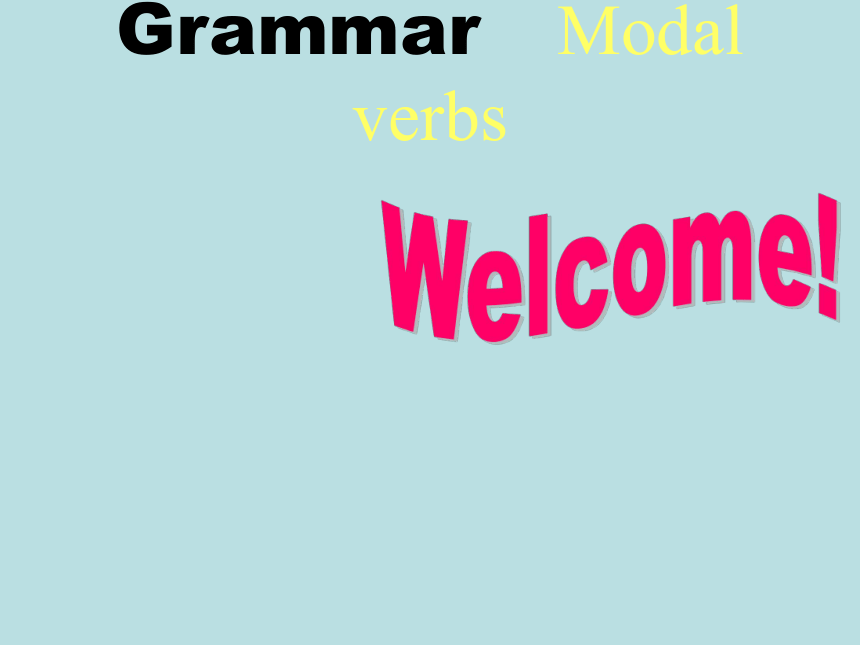 | |
| 格式 | zip | ||
| 文件大小 | 1.3MB | ||
| 资源类型 | 教案 | ||
| 版本资源 | 牛津译林版 | ||
| 科目 | 英语 | ||
| 更新时间 | 2012-05-02 09:30:06 | ||
图片预览

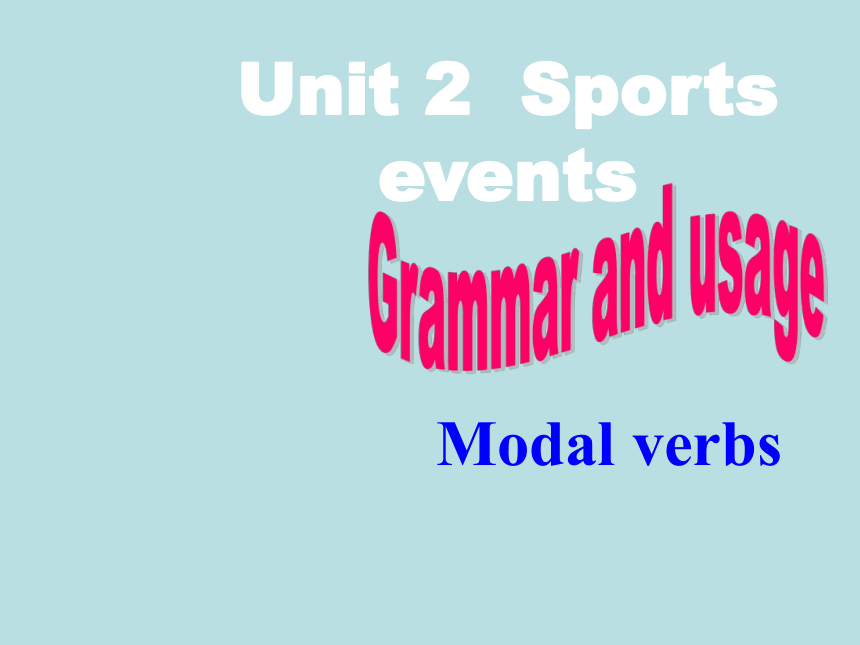
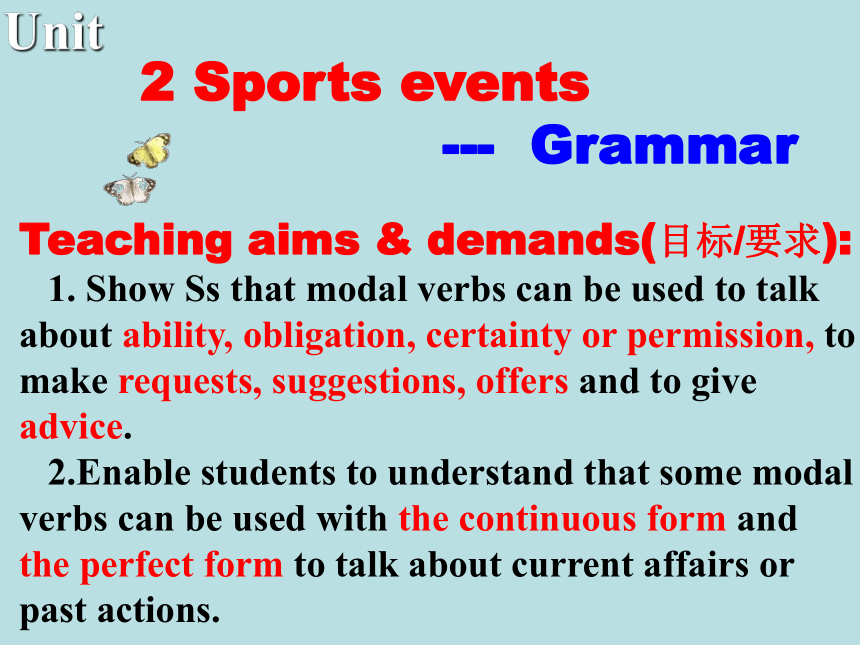
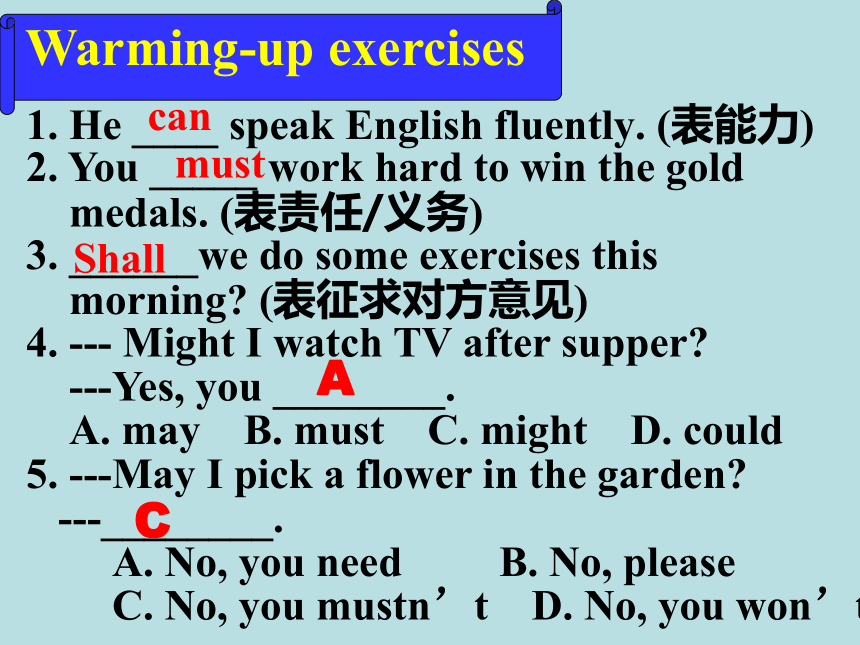
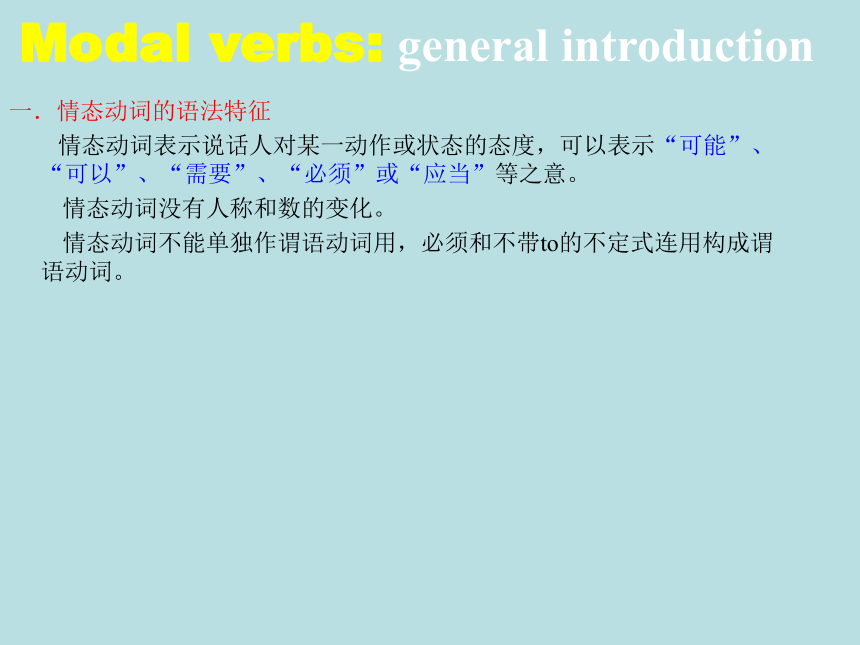
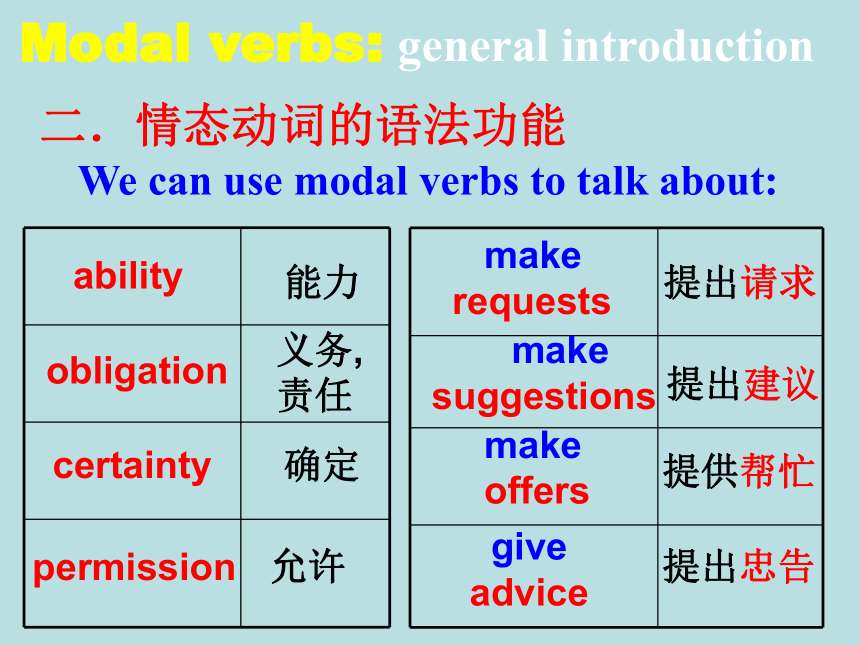
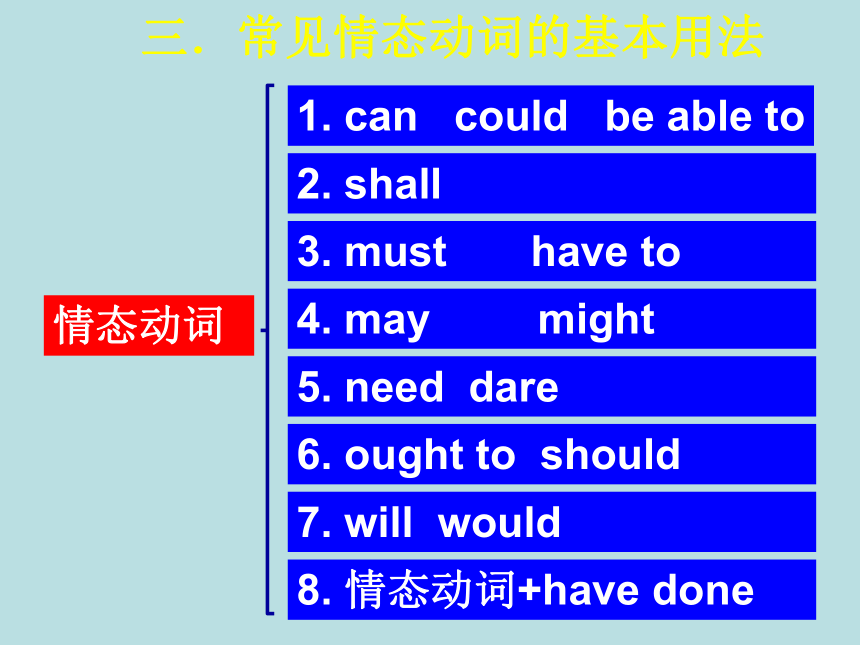
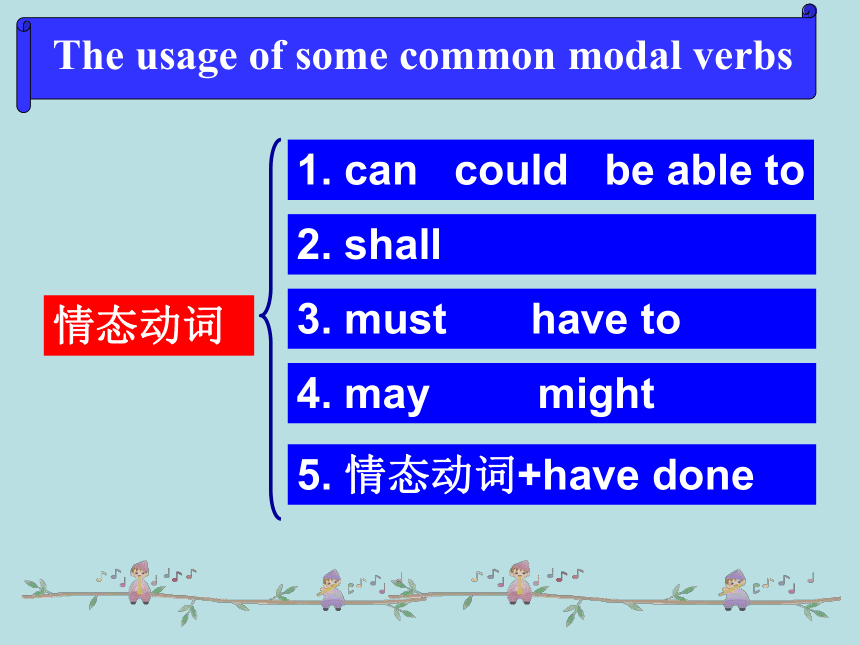
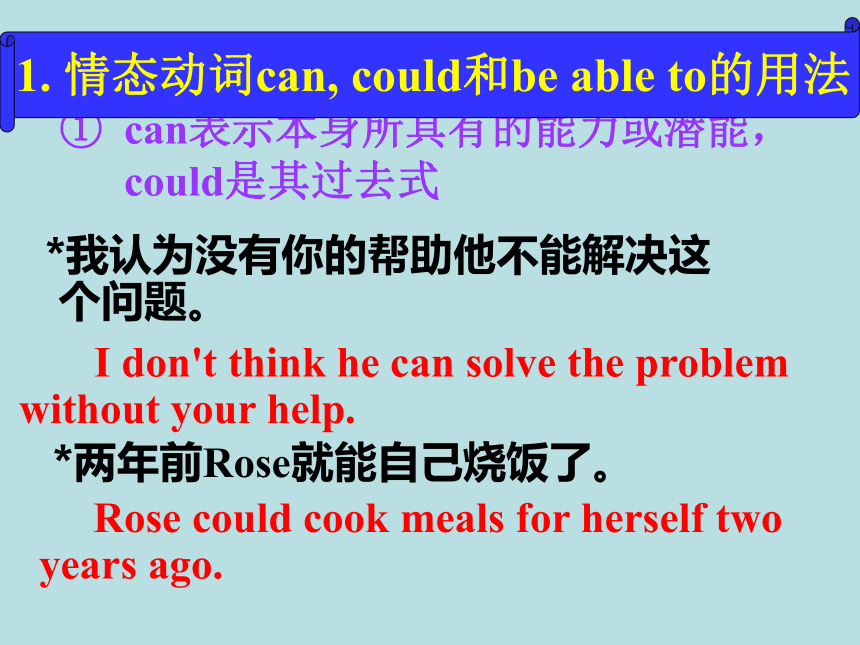
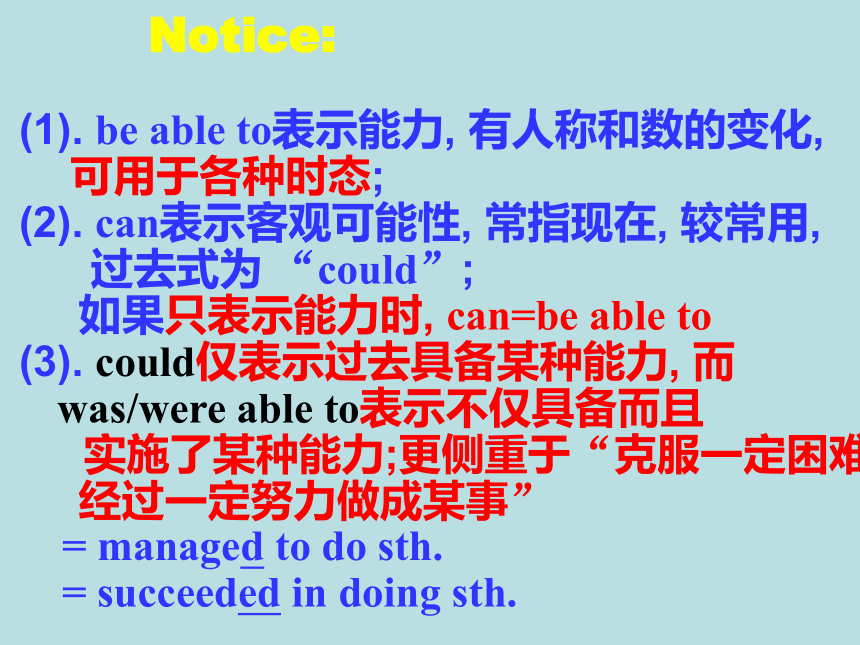


文档简介
(共42张PPT)
Grammar Modal verbs
Unit 2 Sports events
Modal verbs
Unit
2 Sports events
--- Grammar
Teaching aims & demands(目标/要求):
1. Show Ss that modal verbs can be used to talk about ability, obligation, certainty or permission, to make requests, suggestions, offers and to give advice.
2.Enable students to understand that some modal verbs can be used with the continuous form and the perfect form to talk about current affairs or past actions.
Warming-up exercises
He ____ speak English fluently. (表能力)
2. You _____ work hard to win the gold
medals. (表责任/义务)
3. ______we do some exercises this
morning (表征求对方意见)
4. --- Might I watch TV after supper
---Yes, you ________.
A. may B. must C. might D. could
5. ---May I pick a flower in the garden
---________.
A. No, you need B. No, please
C. No, you mustn’t D. No, you won’t
must
can
Shall
A
C
一.情态动词的语法特征
情态动词表示说话人对某一动作或状态的态度,可以表示“可能”、“可以”、“需要”、“必须”或“应当”等之意。
情态动词没有人称和数的变化。
情态动词不能单独作谓语动词用,必须和不带to的不定式连用构成谓语动词。
Modal verbs: general introduction
二.情态动词的语法功能
We can use modal verbs to talk about:
ability
certainty
permission
obligation
make
requests
make
suggestions
make
offers
give
advice
能力
义务,
责任
确定
允许
提出请求
提出建议
提供帮忙
提出忠告
Modal verbs: general introduction
情态动词
1. can could be able to
2. shall
4. may might
三.常见情态动词的基本用法
3. must have to
7. will would
5. need dare
6. ought to should
8. 情态动词+have done
情态动词
1. can could be able to
2. shall
4. may might
The usage of some common modal verbs
3. must have to
5. 情态动词+have done
① can表示本身所具有的能力或潜能,
could是其过去式
*我认为没有你的帮助他不能解决这
个问题。
I don't think he can solve the problem without your help.
*两年前Rose就能自己烧饭了。
Rose could cook meals for herself two
years ago.
1. 情态动词can, could和be able to的用法
Notice:
(1). be able to表示能力, 有人称和数的变化,
可用于各种时态;
(2). can表示客观可能性, 常指现在, 较常用,
过去式为 “could”;
如果只表示能力时, can=be able to
(3). could仅表示过去具备某种能力, 而
was/were able to表示不仅具备而且
实施了某种能力;更侧重于“克服一定困难,
经过一定努力做成某事”
= managed to do sth.
= succeeded in doing sth.
E.g:
* He was able to swim across the river
before the ship sank.
【Practice】
*He managed to get the radio repaired
without any help.
=He ______________/________________
the radio repaired without any help.
was able to get
succeeded in getting
*据说我们下周要进行期中考试,
这消息是真的吗?
It’s said that we will have the mid-term
exam next week.
现在: could/can’t be
过去: can’t/couldn’t have done
because I met him in his office just now.
*他不可能去了国外,因为我刚刚在他的
办公室遇见他。
Can the news be true
He can't have gone abroad,
②can和could还可用于表示对事情可能性的
推测(常用于否, 疑句中)
E.g:
---Could I use your pen (语气委婉)
---Yes, you can.
No, you can’t /mustn’t.
④过去式could常用于疑问句中, 比can更加委婉, 表示礼貌。肯定回答时, 常用原形can或者may, 不可再用过去式could。
*吸烟往往会导致癌症。
Smoking can cause cancer.
*It can be very cold here in winter.
这的冬天有时会很冷。
③在肯定句中, can还可表示“有时会,往往会”
2. shall用法
shall常用于第一,三人称疑问句中,表示征求对方意见,用于二、三人称陈述句中表示意图、决心、命令、警告、允诺、强制等,在法律法规等文件中表示义务或规定,可译为“必须,应该,可以”等。
Shall he clean the blackboard for you
Take it easy. You _________be offered a job in this company.
Mike ___________spare no effort to study.
(1) “The interest ______be divided into five parts according to the agreement made by both sides.” declared the judge.
A. may B. should C. must D. shall
shall
shall
D
表“法律法规等文件中表示义务或规定”
(2) ---Excuse me, but I want to use your computer to type a report.
---You_______ have my computer if you don’t take care of it.
A. shan’t B. might not
C. needn’t D. shouldn’t
(3) The boss said to the secretary, “ If you work well, you ______ have a rise.”
A. must B. ought C. shall D. would
A
C
表“警告”
表“允诺”
3. 情态动词must和have to的用法:
①“must”与“have to” 都表示“必须,不得不”
must: 指说话人认为“主观”上有必要
have to: 指根据约定, 事情的因素有必要
做某事---“客观”
Ex:
*The train leaves at 7 o’clock.
I ___________ (must / have to) go now.
*I don’t like my watch. I _______
(must / have to) buy a new one.
have to
must
E.g:
---你现在就得回家吗?
---是的, 我现在就得回家。
不, 我现在不需要回家。
---Must you go home now (必须)
②在疑问句中“must”表示“必须”的回答形式
肯定 “Yes, sb. must.”;
否定 “No, sb. needn’t.”
或“No, sb. don’t (doesn’t) have to.”
*don’t have to = needn’t 没必要
---Yes, I must./ No, I needn’t.
=I don’t have to.
★表示对现在的肯定推测
must do (状态动词, 如: live/have/know),
must be (doing)
★表示对过去的肯定推测
must have done
③must只能用于表示肯定的推测, 指“一定, 肯定”;
[Practice]
*你现在一定困了。
He must have watched the football match
last night.
You must be sleepy now.
*你现在一定困了, 不是吗
*他昨晚一定看足球比赛了。
You must be sleepy now, aren’t you
*He must have watched film last night, ___
*He must have watched film, ______
A. hasn’t he B. mustn’t he
C. didn’t he D. hadn’t he
C
A
④mustn’t 表示“不准、禁止”
*你们不准在学校吸烟。
You mustn’t smoke at school.
⑤must有时表示“偏要”,含“责备,抱怨”之意
(1)我已经跟你讲过很多遍了, 为什么你偏要
在课堂上讲话呢?
(2)现在已是午夜了, 你偏要这个时候弹
钢琴吗?
I have told you many times.
____________________________
It is midnight. _________________________
Must you play the piano now
Why must you talk in class
4. may / might,
(1)表示 “许可”时:
①might, 比较委婉, 一般多用于疑问句;
②在以could, might表示征询对方意见或表示
请求时, 回答应相应使用can, may;
③表示允许(肯定句)和请求(疑问句)若回答
表示 “不可以/不准” 时, 一般用mustn’t.
E.g:
---May/Might I use your dictionary
---Yes, ________.// No, you _________.
may/can
mustn’t
(2)表猜测时, “may, might”能用于陈述句中,
有“或许, 大概, 可能”之意;
现在 “may/might + 状态动词”
过去 “may/might have done”
may的可能性较大, might的可能性最小;
(3)may可以表示 “祝愿”, might不能这样用
E.g:
*希望上帝保佑你!
May God bless you!
*Rose may be busy now.
*Rose might have returned home, but I’m
not sure.
*但愿你快乐!
May you be happy!
Practice:
1、 --- Might I watch TV after supper
---Yes, you ________.
A. may B. must C. might D. could
2、 --- Where is my dictionary I remember I put it here yesterday.
---You _____it in the wrong place.
A. must put B. should have put
C. might put D. might have put
A
D
must have done
过去一定做过某事
can’t have done
过去不可能做过某事
should ( ought to ) have done
过去本该做某事却没做
shouldn’t ( ought not to ) have done
过去本不该做某事却做了
5. 情态动词+have done表示对已经发生事情推测、
责怪、后悔、遗憾等。
needn’t have don
过去没有必要做某事而实际上却做了
could have done
过去本可以做某事却没做
may / might have done
过去可能已经做了某事
5. 情态动词+have done表示对已经发生事情推测、
责怪、后悔、遗憾等。
1. The weather turned out to be fine yesterday. I___ the trouble to carry my umbrella with me.
A. should have taken B. could have taken
C. needn’t have taken D. mustn’t have taken
2. ---I’ll tell Mary about her new job tomorrow.
---You __________her last week.
A. ought to tell B. would have told
C. must tell D. should have told
C
D
Practice
3. She _______ have left school, for her bike is still here.
A. can’t B. wouldn’t C. shouldn’t D. needn’t
4. --- I can’t find my purse anywhere.
--- You ______ have lost it while shopping.
A. may B. can C. should D. would
5. --- I stayed at a hotel while in New York.
--- Oh, did you You ______with Barbara.
A. could have stayed B. could stay
C. would stay D. must have stayed
A
A
A
A B C D E
F G H I J
Group Competition
–What sort of house do you want to have
Something big
--Well, it ________ be big—that’s not important.
A. mustn’t B. needn’t C. can’t D. won’t
2. 改错
Mr. Li mustn’t have gone to Shanghai
because I saw him a few minutes ago.
B
Back
can’t
must表推测只用于肯定句, 否定句中表推测
用can’t;
mustn’t 指 “禁止、不准”
1. He said that the bike ___ stolen and that he___ have to telephone the police.
A. was, would B. has, will
C. has been, will D. had been, would not
2.Mr. Bush is on time for everything. How ____ it be that he was late for the opening ceremony
A. can B. should C. may D. must
D
Back
A
1.
1. It has been announced that candidates ______ remain in their seats until all the papers have been collected.
A. can B. will C. may D. shall
2 .You can’t imagine that a well –behaved gentleman ______ be so rude to a lady.
A. might B. need C. should D. would
D
C
Back
1. Tom, finish your homework first, or you ___________ watch TV!
A. shan’t B. couldn’t C. needn’t D. may not
2. ---She looks very happy. She ______
(must / might) have passed the exam.
---I guess so. It’s not difficult after all.
A
Back
must
1. ---Could I borrow your dictionary
---Yes, of course you _______.
A. might B. will
C. can D. should
2. Hearing the steps of the police, the thief _______ move at all.
A. dares not B. dared not to
C. didn’t dare to D. not dare
C
C
Back
1. ---Where is my dictionary I remember
I put it here yesterday.
---You ____it in the wrong place.
A. must put B. should have put
C. might put D. might have put
2. ---Is John coming by train
---He should, but he _____not. He likes
driving his car.
A. must B. can C. need D. may
D
D
Back
表对过去可能性的推测。
1. Mike, look at the time. ______you play the piano at such a late hour
A. Must B. Can
C. May D. Need
2. She is already two hours late. What ________to her
A. may have happened
B. can have happened
C. should have happened
D. must happen
A
Back
B
1. If it were not for the fact that she __sing, I would invite her to the party.
A. couldn’t B. shouldn’t
C. can’t D. might not
C
2.It is recommended that passengers _______ keep their cell phones on when the plane is landing.
not B. need not C. could not
D. would not
Back
can’t 表能力, 此处表示她本身能唱歌的
一个客观事实。
A
1. I didn’t hear the phone. I ___asleep.
A. must be
B. must have been
C. should be
D. should have been
2. My suggestion is that Tom__ abroad and he stay here until the project completes.
send B. should not send
C. be sent D. not be sent
B
Back
D
1. A __________ candle _________ the faces of everybody in the room. They all looked tired.
A. lit , lit up B. lit up , lit C. lighted, lit up D. lighted, lit
2 .There is a party tonight _____ our new president, and I am ______ to be invited.
A. in honor; honored
B. in place of; of great honor
C. in great honor; in favor of
D. in honor of; honored
Back
D
C
Homework
Review the modal verbs we learnt today;
2. Finish Step III Practice of Learning
plan 4-5.
Grammar Modal verbs
Unit 2 Sports events
Modal verbs
Unit
2 Sports events
--- Grammar
Teaching aims & demands(目标/要求):
1. Show Ss that modal verbs can be used to talk about ability, obligation, certainty or permission, to make requests, suggestions, offers and to give advice.
2.Enable students to understand that some modal verbs can be used with the continuous form and the perfect form to talk about current affairs or past actions.
Warming-up exercises
He ____ speak English fluently. (表能力)
2. You _____ work hard to win the gold
medals. (表责任/义务)
3. ______we do some exercises this
morning (表征求对方意见)
4. --- Might I watch TV after supper
---Yes, you ________.
A. may B. must C. might D. could
5. ---May I pick a flower in the garden
---________.
A. No, you need B. No, please
C. No, you mustn’t D. No, you won’t
must
can
Shall
A
C
一.情态动词的语法特征
情态动词表示说话人对某一动作或状态的态度,可以表示“可能”、“可以”、“需要”、“必须”或“应当”等之意。
情态动词没有人称和数的变化。
情态动词不能单独作谓语动词用,必须和不带to的不定式连用构成谓语动词。
Modal verbs: general introduction
二.情态动词的语法功能
We can use modal verbs to talk about:
ability
certainty
permission
obligation
make
requests
make
suggestions
make
offers
give
advice
能力
义务,
责任
确定
允许
提出请求
提出建议
提供帮忙
提出忠告
Modal verbs: general introduction
情态动词
1. can could be able to
2. shall
4. may might
三.常见情态动词的基本用法
3. must have to
7. will would
5. need dare
6. ought to should
8. 情态动词+have done
情态动词
1. can could be able to
2. shall
4. may might
The usage of some common modal verbs
3. must have to
5. 情态动词+have done
① can表示本身所具有的能力或潜能,
could是其过去式
*我认为没有你的帮助他不能解决这
个问题。
I don't think he can solve the problem without your help.
*两年前Rose就能自己烧饭了。
Rose could cook meals for herself two
years ago.
1. 情态动词can, could和be able to的用法
Notice:
(1). be able to表示能力, 有人称和数的变化,
可用于各种时态;
(2). can表示客观可能性, 常指现在, 较常用,
过去式为 “could”;
如果只表示能力时, can=be able to
(3). could仅表示过去具备某种能力, 而
was/were able to表示不仅具备而且
实施了某种能力;更侧重于“克服一定困难,
经过一定努力做成某事”
= managed to do sth.
= succeeded in doing sth.
E.g:
* He was able to swim across the river
before the ship sank.
【Practice】
*He managed to get the radio repaired
without any help.
=He ______________/________________
the radio repaired without any help.
was able to get
succeeded in getting
*据说我们下周要进行期中考试,
这消息是真的吗?
It’s said that we will have the mid-term
exam next week.
现在: could/can’t be
过去: can’t/couldn’t have done
because I met him in his office just now.
*他不可能去了国外,因为我刚刚在他的
办公室遇见他。
Can the news be true
He can't have gone abroad,
②can和could还可用于表示对事情可能性的
推测(常用于否, 疑句中)
E.g:
---Could I use your pen (语气委婉)
---Yes, you can.
No, you can’t /mustn’t.
④过去式could常用于疑问句中, 比can更加委婉, 表示礼貌。肯定回答时, 常用原形can或者may, 不可再用过去式could。
*吸烟往往会导致癌症。
Smoking can cause cancer.
*It can be very cold here in winter.
这的冬天有时会很冷。
③在肯定句中, can还可表示“有时会,往往会”
2. shall用法
shall常用于第一,三人称疑问句中,表示征求对方意见,用于二、三人称陈述句中表示意图、决心、命令、警告、允诺、强制等,在法律法规等文件中表示义务或规定,可译为“必须,应该,可以”等。
Shall he clean the blackboard for you
Take it easy. You _________be offered a job in this company.
Mike ___________spare no effort to study.
(1) “The interest ______be divided into five parts according to the agreement made by both sides.” declared the judge.
A. may B. should C. must D. shall
shall
shall
D
表“法律法规等文件中表示义务或规定”
(2) ---Excuse me, but I want to use your computer to type a report.
---You_______ have my computer if you don’t take care of it.
A. shan’t B. might not
C. needn’t D. shouldn’t
(3) The boss said to the secretary, “ If you work well, you ______ have a rise.”
A. must B. ought C. shall D. would
A
C
表“警告”
表“允诺”
3. 情态动词must和have to的用法:
①“must”与“have to” 都表示“必须,不得不”
must: 指说话人认为“主观”上有必要
have to: 指根据约定, 事情的因素有必要
做某事---“客观”
Ex:
*The train leaves at 7 o’clock.
I ___________ (must / have to) go now.
*I don’t like my watch. I _______
(must / have to) buy a new one.
have to
must
E.g:
---你现在就得回家吗?
---是的, 我现在就得回家。
不, 我现在不需要回家。
---Must you go home now (必须)
②在疑问句中“must”表示“必须”的回答形式
肯定 “Yes, sb. must.”;
否定 “No, sb. needn’t.”
或“No, sb. don’t (doesn’t) have to.”
*don’t have to = needn’t 没必要
---Yes, I must./ No, I needn’t.
=I don’t have to.
★表示对现在的肯定推测
must do (状态动词, 如: live/have/know),
must be (doing)
★表示对过去的肯定推测
must have done
③must只能用于表示肯定的推测, 指“一定, 肯定”;
[Practice]
*你现在一定困了。
He must have watched the football match
last night.
You must be sleepy now.
*你现在一定困了, 不是吗
*他昨晚一定看足球比赛了。
You must be sleepy now, aren’t you
*He must have watched film last night, ___
*He must have watched film, ______
A. hasn’t he B. mustn’t he
C. didn’t he D. hadn’t he
C
A
④mustn’t 表示“不准、禁止”
*你们不准在学校吸烟。
You mustn’t smoke at school.
⑤must有时表示“偏要”,含“责备,抱怨”之意
(1)我已经跟你讲过很多遍了, 为什么你偏要
在课堂上讲话呢?
(2)现在已是午夜了, 你偏要这个时候弹
钢琴吗?
I have told you many times.
____________________________
It is midnight. _________________________
Must you play the piano now
Why must you talk in class
4. may / might,
(1)表示 “许可”时:
①might, 比较委婉, 一般多用于疑问句;
②在以could, might表示征询对方意见或表示
请求时, 回答应相应使用can, may;
③表示允许(肯定句)和请求(疑问句)若回答
表示 “不可以/不准” 时, 一般用mustn’t.
E.g:
---May/Might I use your dictionary
---Yes, ________.// No, you _________.
may/can
mustn’t
(2)表猜测时, “may, might”能用于陈述句中,
有“或许, 大概, 可能”之意;
现在 “may/might + 状态动词”
过去 “may/might have done”
may的可能性较大, might的可能性最小;
(3)may可以表示 “祝愿”, might不能这样用
E.g:
*希望上帝保佑你!
May God bless you!
*Rose may be busy now.
*Rose might have returned home, but I’m
not sure.
*但愿你快乐!
May you be happy!
Practice:
1、 --- Might I watch TV after supper
---Yes, you ________.
A. may B. must C. might D. could
2、 --- Where is my dictionary I remember I put it here yesterday.
---You _____it in the wrong place.
A. must put B. should have put
C. might put D. might have put
A
D
must have done
过去一定做过某事
can’t have done
过去不可能做过某事
should ( ought to ) have done
过去本该做某事却没做
shouldn’t ( ought not to ) have done
过去本不该做某事却做了
5. 情态动词+have done表示对已经发生事情推测、
责怪、后悔、遗憾等。
needn’t have don
过去没有必要做某事而实际上却做了
could have done
过去本可以做某事却没做
may / might have done
过去可能已经做了某事
5. 情态动词+have done表示对已经发生事情推测、
责怪、后悔、遗憾等。
1. The weather turned out to be fine yesterday. I___ the trouble to carry my umbrella with me.
A. should have taken B. could have taken
C. needn’t have taken D. mustn’t have taken
2. ---I’ll tell Mary about her new job tomorrow.
---You __________her last week.
A. ought to tell B. would have told
C. must tell D. should have told
C
D
Practice
3. She _______ have left school, for her bike is still here.
A. can’t B. wouldn’t C. shouldn’t D. needn’t
4. --- I can’t find my purse anywhere.
--- You ______ have lost it while shopping.
A. may B. can C. should D. would
5. --- I stayed at a hotel while in New York.
--- Oh, did you You ______with Barbara.
A. could have stayed B. could stay
C. would stay D. must have stayed
A
A
A
A B C D E
F G H I J
Group Competition
–What sort of house do you want to have
Something big
--Well, it ________ be big—that’s not important.
A. mustn’t B. needn’t C. can’t D. won’t
2. 改错
Mr. Li mustn’t have gone to Shanghai
because I saw him a few minutes ago.
B
Back
can’t
must表推测只用于肯定句, 否定句中表推测
用can’t;
mustn’t 指 “禁止、不准”
1. He said that the bike ___ stolen and that he___ have to telephone the police.
A. was, would B. has, will
C. has been, will D. had been, would not
2.Mr. Bush is on time for everything. How ____ it be that he was late for the opening ceremony
A. can B. should C. may D. must
D
Back
A
1.
1. It has been announced that candidates ______ remain in their seats until all the papers have been collected.
A. can B. will C. may D. shall
2 .You can’t imagine that a well –behaved gentleman ______ be so rude to a lady.
A. might B. need C. should D. would
D
C
Back
1. Tom, finish your homework first, or you ___________ watch TV!
A. shan’t B. couldn’t C. needn’t D. may not
2. ---She looks very happy. She ______
(must / might) have passed the exam.
---I guess so. It’s not difficult after all.
A
Back
must
1. ---Could I borrow your dictionary
---Yes, of course you _______.
A. might B. will
C. can D. should
2. Hearing the steps of the police, the thief _______ move at all.
A. dares not B. dared not to
C. didn’t dare to D. not dare
C
C
Back
1. ---Where is my dictionary I remember
I put it here yesterday.
---You ____it in the wrong place.
A. must put B. should have put
C. might put D. might have put
2. ---Is John coming by train
---He should, but he _____not. He likes
driving his car.
A. must B. can C. need D. may
D
D
Back
表对过去可能性的推测。
1. Mike, look at the time. ______you play the piano at such a late hour
A. Must B. Can
C. May D. Need
2. She is already two hours late. What ________to her
A. may have happened
B. can have happened
C. should have happened
D. must happen
A
Back
B
1. If it were not for the fact that she __sing, I would invite her to the party.
A. couldn’t B. shouldn’t
C. can’t D. might not
C
2.It is recommended that passengers _______ keep their cell phones on when the plane is landing.
not B. need not C. could not
D. would not
Back
can’t 表能力, 此处表示她本身能唱歌的
一个客观事实。
A
1. I didn’t hear the phone. I ___asleep.
A. must be
B. must have been
C. should be
D. should have been
2. My suggestion is that Tom__ abroad and he stay here until the project completes.
send B. should not send
C. be sent D. not be sent
B
Back
D
1. A __________ candle _________ the faces of everybody in the room. They all looked tired.
A. lit , lit up B. lit up , lit C. lighted, lit up D. lighted, lit
2 .There is a party tonight _____ our new president, and I am ______ to be invited.
A. in honor; honored
B. in place of; of great honor
C. in great honor; in favor of
D. in honor of; honored
Back
D
C
Homework
Review the modal verbs we learnt today;
2. Finish Step III Practice of Learning
plan 4-5.
